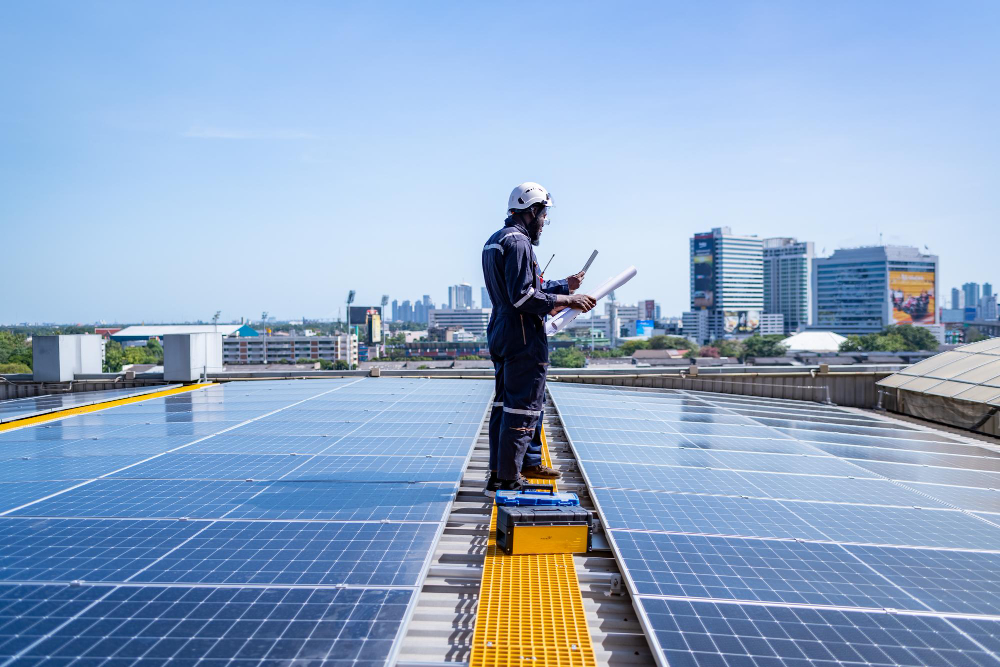Understanding how solar panels work can help you as solar panels have become an increasingly popular choice for homeowners seeking to reduce their electricity bills and allow them to make informed decisions about installing a solar system at home. This comprehensive guide will delve into the workings of solar panels, their benefits, and how to choose the best solar panels for home use. We will also discuss the solar system for home price in India and tools like a solar calculator to estimate your savings.
Understanding How Solar Panels Work
The Basics of Solar Power Solar Panels work through a process called the photovoltaic effect where they convert sunlight into electricity. There are a lot of pieces to this:
- Photovoltaic (PV) Cells: The core components of solar panels are composed of materials such as silicon. Sunlight strikes the PV cells, knocking electrons loose and creating an electric current.
- Inverter: Changes the direct current (DC) electricity created by the PV cells into alternating current (AC) electricity, which is what you use in your home.
- Mounting system: Attaches the solar panels to your roof or area.
- Battery Storage: optional yet increasingly popular, to store any excess energy for use when the sun is not shining.
How PV Cells Generate Electricity
The semiconductor material absorbs the photons from sunlight and photons knock loose electrons in the silicon. This energy makes the electrons excited so that they are free to flow. These free electrons flow away from the cell to the metal contacts, and thus — captured at the top and bottom of PV cells by metal contacts — when connected to an electric circuit, they create an electric current.
Factors Influencing Solar Panel Efficiency
Several factors affect the efficiency and performance of solar panels:
- Panel Orientation and Tilt: Panels should be oriented to capture the maximum amount of sunlight, typically facing south in the northern hemisphere.
- Shading: Even partial shading can significantly reduce a panel’s efficiency.
- Temperature: High temperatures can reduce the efficiency of solar panels.
- Quality of Materials: High-quality panels typically perform better and last longer.
Choosing the Best Solar Panels for Home Use
When selecting the best solar panels for home, consider the following factors:
- Efficiency: Higher efficiency panels generate more electricity from the same amount of sunlight.
- Durability: Look for panels with strong warranties and proven longevity.
- Cost: Balance your budget with the expected performance and savings.
- Manufacturer Reputation: Choose reputable manufacturers known for quality and customer service.
Solar Panel Price in India for Home Use
The solar panel price in India for home use varies widely based on several factors, including the type of panel, the manufacturer, and the installation costs. On average, solar panels can range from INR 20,000 to INR 60,000 per kW. Additional costs include inverters, mounting systems, and potential battery storage.
Factors Affecting Costs
- Panel Type: Monocrystalline panels tend to be more expensive but offer higher efficiency. Polycrystalline panels are more affordable but slightly less efficient.
- System Size: Larger systems cost more but provide greater savings in the long run.
- Installation: Professional installation ensures optimal performance and longevity but adds to the initial cost.
Solar System for Home Price in India
The solar system for home price in India can vary depending on the size and components of the system. For a typical home, a 3 kW to 5 kW system is often sufficient, costing between INR 1,00,000 and INR 3,00,000 including installation.
Cost Breakdown
- Panels: INR 20,000 to INR 60,000 per kW
- Inverter: INR 15,000 to INR 25,000
- Mounting and Installation: INR 10,000 to INR 30,000
- Battery (optional): INR 20,000 to INR 70,000
Using a solar calculator can help estimate the total cost and potential savings based on your specific energy usage and location.
Finding the Best Solar Panel in India for Home
To find the best solar panel in India for home, consider the following top brands known for quality and reliability:
- Tata Power Solar: Known for high-efficiency panels and robust customer support.
- Loom Solar: Offers a range of affordable and efficient panels.
- Waaree Energies: Provides durable panels with strong warranties.
- Adani Solar: A reputable brand with high-quality products and good service.
Using a Solar Calculator
A solar calculator is a valuable tool for estimating the costs and benefits of installing solar panels. It considers factors like your location, roof size, energy consumption, and local electricity rates to provide an estimate of the system size you need, the cost, and your potential savings.
How to Use a Solar Calculator
- Enter Your Location: This helps determine the amount of sunlight your area receives.
- Input Your Energy Consumption: Provide details about your average monthly electricity usage.
- Roof Size and Orientation: Input the dimensions and orientation of your roof.
- Calculate: The tool will estimate the optimal system size, costs, and savings.
Conclusion
Solar panels offer a sustainable and cost-effective way to power your home. Understanding how they work and knowing what to look for in the best solar panels for home can help you make the best decision for your energy needs. Considering the solar panel price in India for home use and using a solar calculator can further aid in planning and budgeting your solar installation. With the right information and tools, you can harness the power of the sun to reduce your electricity bills and contribute to a greener planet.





